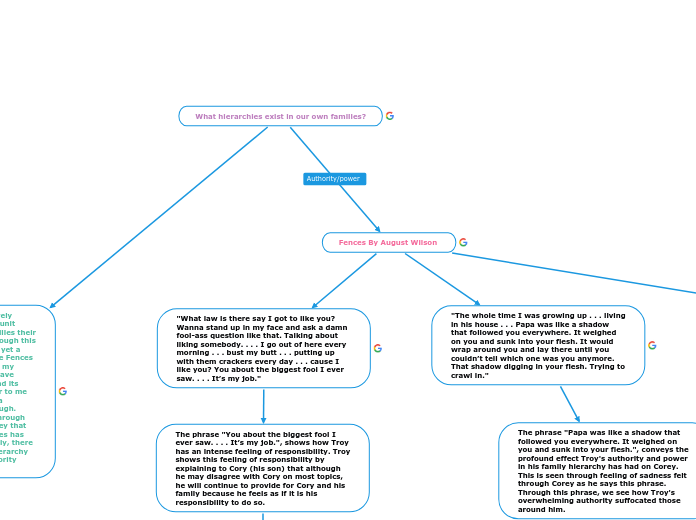作者:resul resulani 2 年以前
158
What hierarchies exist in our own families?

作者:resul resulani 2 年以前
158

The feeling of power radiating from Troy in this scene, answers the first unit question, "What hierarchies exist in our own families" by showing through Troy's relationship with Corey, How in our families, there is a common hierarchy of authority or power. Troy shows this by how the immense authority and pressure he places on Corey stoped him (Corey) from being able to hit his father with the baseball bat.
Before l heard this quote, I was listening to the movie to try to pick up on how Troy's character got worse and worse throughout the movie. It wasn't until I came across this quote that I was able to truly see how much of a massive change in character Troy has had - from kind, lovable, charming family man - to telling his son that if he has to guts to stand up to him with a bat, then he should be prepared to have to kill him. This quote opened my eyes to what a... quite frankly horrible person Troy has morphed into as the story progressed. This all connects back to the hierarchy of power noted beforehand because of how it's shown that as the story progresses and Troy losses more and more power over his family, the more unhinged and aggressive he becomes out of desperation to hold onto his feeling of power that Troy thinks that he is owed from his family.
Corey's feelings of sadness and resentment resulting from Troy's power over him answers the first unit question, "What hierarchies exist in our own families" by demonstrating how in our families, their is often a constant pressure from those who have authority, this manifests as a hierarchy based on power. Furthermore, it shows how those who contain the power in a family, are often those with the direct ability to either positively or negatively affect other members of the family.
Before l came across this quote, I was watching the movie to better understand why the relationship between Troy and Corey seems so tense, but this quote answered that question, Their relationship is so full of tension and turmoil because of the difference in power between father and son. Not physical power, but the difference in influence or authority between Corey and his father Troy.
Troy's feelings of responsibility is read across the movie as him displaying his authority over his family to make sure that they are headed down what he thinks to be the right path. Essentially, Troy uses his authority over the rest of his family to control their actions. This answers the unit question of "what hierarchies exist in our families" by showing how many families have a hierarchy of authority/power.
Before I heard this quote, I was watching the movie to analyze Troy's feelings and why he acts the way he does, but this quote taught me to instead watch the text for how Troy interacts with others and what feelings are associated with these interactions. Furthermore, this quote is very thought-provoking as it is the first real instance we see of Troy using his authority and power to put down others - and therefore has a profound impact on the how the reader perceives Troy and the movie in general.